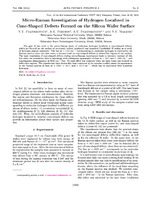| dc.contributor.author | Frantskevich, N. V. | en |
| dc.contributor.author | Fedotov, A. K. | en |
| dc.contributor.author | Frantskevich, A. V. | en |
| dc.contributor.author | Mazanik, N. V. | en |
| dc.date.accessioned | 2017-11-04T11:45:14Z | |
| dc.date.available | 2017-11-04T11:45:14Z | |
| dc.date.issued | 2014 | |
| dc.identifier.citation | Micro-Raman Investigation of Hydrogen Localized in Cone-Shaped Defects Formed on the Silicon Wafer Surface / N. V. Frantskevich [et al.] // Acta Physica Polonica A. – 2014. – Vol. 125, № 6. – P. 1332-1334. – DOI: 10.12693/APhysPolA.125.1332 | en |
| dc.identifier.uri | https://rep.bntu.by/handle/data/34405 | |
| dc.description.abstract | The goal of this work is the micro-Raman study of molecular hydrogen localized in cone-shaped defects, which are formed on the surface of previously helium implanted and annealed Czochralski Si wafers as a result of hydrogen plasma treatment. The line at ≈ 4158 cm corresponding to molecular hydrogen is observed in the Raman spectra when the laser beam is focused both on cone-shaped defects or defect-free regions of the surface. The laser irradiation of cone-shaped defects during micro-Raman experiments leads to intensity increase of this line when the irradiation time is increasing, with subsequent appearance of lines at ≈ 3621 and ≈ 3698 cm–1 and simultaneous disappearance of 4158 cm–1 line. No such effect was observed when the laser beam was focused on defect-free regions. The experiments have shown that heat treatment of the samples studied causes the appearance in the Raman spectra of lines at ≈ 3468, ≈ 3621, and ≈ 3812 cm–1, which can be associated with molecular hydrogen. | en |
| dc.language.iso | en | en |
| dc.title | Micro-Raman Investigation of Hydrogen Localized in Cone-Shaped Defects Formed on the Silicon Wafer Surface | en |
| dc.type | Article | ru |
| dc.identifier.doi | 10.12693/APhysPolA.125.1332 | |

